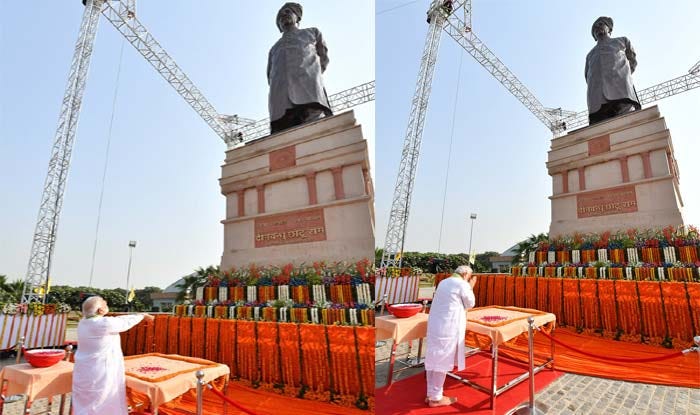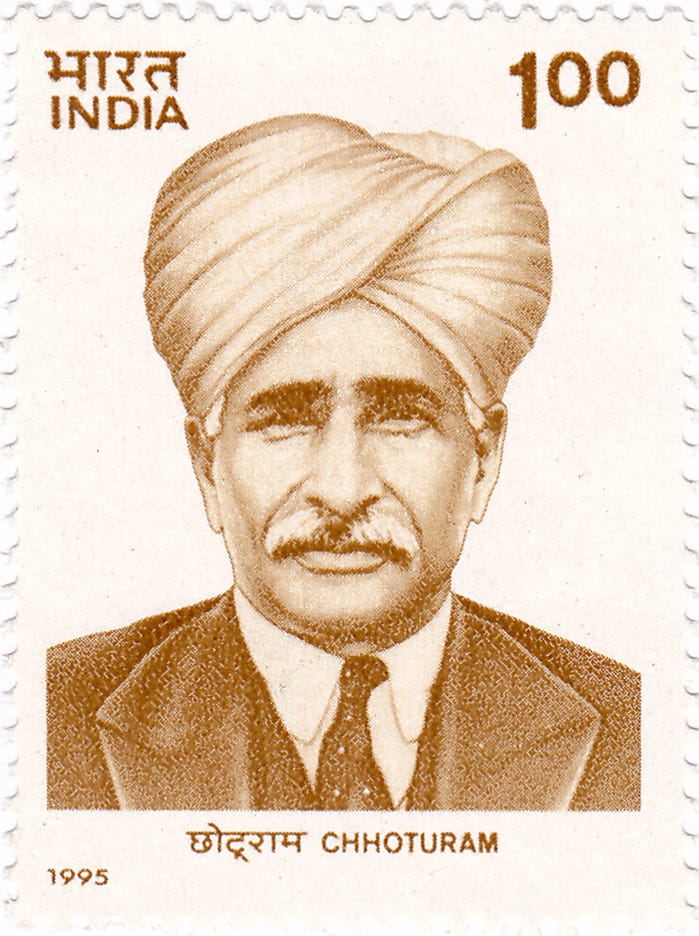Long Live Sir Chhotu Ram— and the Farmers' Debt
Remembering Sir Chhotu Ram: A Legacy of Farmer Advocacy on His Death Anniversary.
A Visionary Leader for Farmers
As we mark the death anniversary of Sir Chhotu Ram on January 9th, we are reminded of the monumental contributions of this iconic leader who championed the cause of farmers in the pre-partition Punjab. His relentless advocacy for agricultural welfare and justice continues to resonate, offering inspiration to the farming community as they navigate modern challenges, characterised by the ongoing farmers agitation.
The Persistent Burden of Farm Debt in Punjab
Apart from the demand for a statutory MSP, farm debt remains one of the most pressing issues in Punjab and Haryana, posing significant challenges to the livelihood of farmers and the state's agricultural backbone. The scale of the crisis is staggering:
As of August 2023, each farmer family in Punjab carries an average debt of Rs 2.95 lakh, distributed across 24,92,663 loan accounts.
Punjab's farmers are the most indebted among all Indian states, as highlighted in a NABARD report presented in the Lok Sabha.
Organized sector debt is estimated at a staggering Rs 73,500 crore, while the unorganized sector—largely driven by arhtiyas (commission agents-cum-moneylenders)—accounts for an additional Rs 30,000 crore.
Political Promises vs. Ground Realities
Political parties have long sought to address farm debt through various schemes and legislation, but the results have been underwhelming:
The Akali-BJP coalition introduced the Punjab Settlement of Agricultural Indebtedness Act, 2016, to curb usurious lending practices.
The Congress government pledged a complete farm debt waiver, eventually waiving Rs 5,810 crore by March 2021, covering 6.96 lakh small and marginal farmers.
Additional waivers worth Rs 590 crore were granted to landless farmers and agricultural laborers.
Despite these efforts, these measures have only addressed about 9% of the outstanding debt in the organized sector, leaving the bulk of the burden unaddressed. This starkly contrasts with the massive relief extended to the corporate sector, where hefty debts of public sector banks are routinely written off under the guise of debt resolution through the new Insolvency and Bankruptcy Code (IBC)1.

The 2016 Act: A Missed Opportunity
The Punjab Settlement of Agricultural Indebtedness Act, 2016, aimed to provide a legal framework for resolving farmer debt issues. However, it has several shortcomings:
It does not mandate the outright cancellation of usurious loans, merely offering forums to evaluate outstanding amounts.
Interest rates remain high, with a cap set at approximately 10.4%, based on SBI’s base lending rate plus NABARD’s rates for cooperative societies.
The Act’s limited scope has rendered it ineffective in addressing the systemic challenges of farm debt.
The Path to Sustainable Solutions
Punjab’s agricultural debt crisis requires a holistic and multi-pronged approach. Key measures include:
Crop Diversification: Breaking the wheat-paddy monoculture by encouraging farmers to cultivate a wider range of crops.
Remunerative MSP: Expanding the Minimum Support Price mechanism to include diverse agricultural produce.
Agro-based Industries: Establishing industries that can process and add value to raw agricultural outputs.
Infrastructure Development: Building robust cold chains and scientific storage facilities to minimize post-harvest losses.
Legal Reforms: Revisiting laws like the Punjab Relief of Indebtedness Act, 1934, and the Punjab Debtor’s Protection Act, 1936, which offered significant protections to farmers.
Honoring Sir Chhotu Ram’s Legacy
Sir Chhotu Ram’s pioneering efforts to safeguard farmers' rights and promote equitable policies serve as a guiding light. Punjab needs bold reforms that echo his transformative spirit, akin to landmark legislation such as the Bonded Labour System (Abolition) Act of 1976. By addressing the root causes of agricultural distress, the state can pay a true tribute to his enduring legacy.
Towards a Resilient Future?
In summary, Punjab’s farm debt crisis is a symptom of deeper systemic issues in its agricultural sector. While recent initiatives have made incremental progress, they fall short of the radical change needed to alleviate the burden on farmers. As the indefinite fast unto death of Farmer Leader Jagjit Singh Dallewal at Khanauri enters its 45th day, the simple and just demand for putting the MSP into a statutory framework remains illusive or even elusive. With 38 fragmented farmer organizations in Punjab, no meaningful talks with the central government appear imminent.
In this scenario, despite the yeoman’s work of Sir Chhotu Ram and the century-long efforts of those who followed in his footsteps, the plight and predicament of Punjab and Haryana’s farmers remain dire. One wonders if things will ever change. By embracing comprehensive reforms and embodying the vision of Sir Chhotu Ram, Punjab can still chart a path toward resilience and prosperity for its farming community. That would be a befitting tribute to the true son of the undivided Punjab, whose stature remains unmatched, in spite of the connotation associated with his name.







ਆਪਣੇ ਕੰਮਾਂ ਅਤੇ ਤਰੱਕੀ ਲਈ ਹਰ ਮਨੁੱਖ ਜੀਵਨ ਭਰ ਯਤਨਸ਼ੀਲ ਹੁੰਦਾ ਹੈ ਅਤੇ ਨਿੱਜੀ ਹਿੱਤਾਂ ਕਾਰਨ ਕਈ ਵਾਰ ਉਹ ਅਜਿਹੇ ਕੰਮ ਵੀ ਕਰ ਬੈਠਦਾ ਜਿਸ ਲਈ ਉਹ ਆਪਣੇ ਆਪ ਨੂੰ ਆਪ ਵੀ ਮੁਆਫ਼ ਨਹੀਂ ਕਰ ਸਕਦਾ।
ਸਰ ਛੋਟੂ ਰਾਮ ਦਾ ਜੀਵਨ ਲੋਕ ਭਲਾਈ ਵਾਸਤੇ ਸੀ । ਉਹਨਾਂ ਤੋਂ ਪਹਿਲਾਂ ਕਮਾਉਂਦਾ ਕੋਈ ਤੇ ਖਾਂਦਾ ਕੋਈ ਹੋਰ ਸੀ। ਇਜਾਰੇਦਾਰੀ ਅਤੇ ਜਗੀਰਦਾਰੀ ਸਿਸਟਮ ਨੂੰ ਤੋੜਨ ਅਤੇ ਸ਼ਾਹੂਕਾਰੀ ਲੁੱਟ ਤੋਂ ਭੋਲੇ ਭਾਲੇ ਅਤੇ ਗਰੀਬ ਲੋਕਾਂ ਨੂੰ ਬਚਾ ਕੇ ਸਵੈ ਮਾਣ ਅਤੇ ਅਣਖ ਵਾਲੀ ਜ਼ਿੰਦਗੀ ਦੇਣ ਵਿੱਚ ਉਹਨਾਂ ਦਾ ਵੱਡਾ ਯੋਗਦਾਨ ਹਮੇਸ਼ਾਂ ਯਾਦ ਰੱਖਿਆ ਜਾਵੇਗਾ
ਨਿਸ਼ਾਨ ਸਿੰਘ ਕਾਹਲੋਂ
Sir: I must admit that, lacking both agricultural expertise and formal education in the field, I am not in a position to offer an informed opinion on the subject. However, your mention of Sir Chhotu Ram stirs a poignant memory—one of a conversation I once had with my father. Though he was only a high school graduate and served as the village Patwari, he revered Sir Chhotu Ram as a crusader for farmers’ rights and spoke of him with profound admiration. My father often recounted how farmers affectionately called him Deenbandhu, the “Friend of the Poor,” for his tireless efforts to uplift their plight.
Yet, in the same breath, he expressed a quiet regret that Sir Chhotu Ram’s son, Sri Chand—who went on to become the first Speaker of the Haryana Vidhan Sabha—did little or nothing to carry forward his father’s legacy of championing farmers’ welfare.
Ps. Thank you for taking me back to memory lane , allowing me to reminisce time spent with my father, my spartan.